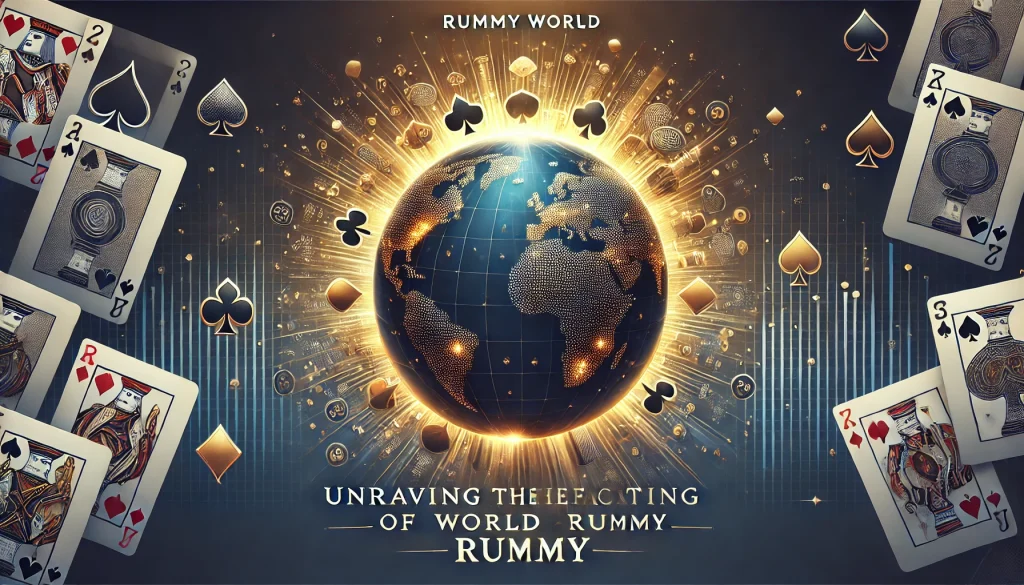Description

A Complete Guide to Rummy The card game that has enthralled players for centuries, rummy has a rich & diverse history that dates back to the early 1800s. Although its precise beginnings are still a little unclear, it is generally accepted that the game developed from earlier card games like the Mexican-originated Conquian. Conquian, which uses similar mechanics involving the formation of melds and sets, is frequently considered the forerunner of modern rummy. The game experienced multiple adaptations as it traveled across borders, giving rise to the wide variety of rummy variations that exist today. Rummy arrived in the US by the late 1800s and quickly became very popular there, especially in gambling establishments and social circles.
In the early to mid-20th century, rummy became a mainstay in American homes as it developed further. Player relationships & camaraderie were fostered by the game, which was frequently played at social events and family get-togethers. Its reputation as a popular past time was further cemented with the introduction of new variations, such as Indian Rummy in the 1930s and Gin Rummy in the 1910s. Rummy’s popularity grew as a result of the development of gaming clubs and commercial card decks. Rummy had grown from its modest origins to become a cultural phenomenon that was discussed in TV series, movies, & books by the 1950s & 1960s.
Millions of players around the world still enjoy rummy’s strategic depth and social interaction, making it a popular game today. Fundamentally, rummy is a card game in which players use a standard deck of cards to form sets and runs. The goal is to be the first player to combine all of your cards into legitimate combinations, which can be runs of three or more cards in a row or sets of three or four cards of the same rank. Depending on the variation, each player is dealt a certain number of cards, usually seven or ten.
One card is dealt face-up to begin the discard pile, and the other cards form a draw pile. At the end of their turn, each player discards one card after drawing cards from either pile. For any prospective rummy player, it is imperative to comprehend the fundamental rules.
In addition to planning their own gameplay, players must monitor the moves of their rivals. Until one player successfully melds every card in their deck or the draw pile runs out, the game is over. Some variations allow for more dynamic gameplay by allowing players to lay down their melds during their turn.
Different rummy variations can have quite different scoring schemes, but generally speaking, points are given according to how many cards are still in opponents’ hands after one player leaves. Because players must strike a balance between the need to minimize the number of points left in their possession & the desire to meld quickly, this scoring element adds another layer of strategy. There are numerous variations of rummy to suit varying tastes and skill levels, so it’s not a single activity.
Gin Rummy, which is played between two players and stresses strategic discarding and deft card management, is one of the most well-liked variations. Deadwood, or unmatched cards that can result in point penalties, is something that players in Gin Rummy try to minimize while forming melds. Indian Rummy is another well-known variation that usually uses two decks of cards and permits more intricate melds and sequences.
This variation is very popular in India and is frequently played in both social and competitive contexts. Kalooki Rummy, which adds wild cards to the mix and gives classic gameplay a thrilling twist, is another noteworthy variation. Another game is Contract Rummy, in which players have to fulfill predetermined goals or contracts over a number of rounds in order to win. It is crucial for players to become acquainted with the particular mechanics before beginning, as every variation has its own distinct set of rules and strategies.
Regardless of your preference for a fast-paced game like Gin Rummy or a more complex one like Indian Rummy, there is a variation that will fit your preferences & improve your gaming experience. Rummy players need to gain a deep comprehension of psychology and strategy in order to succeed. Keeping a close eye on the cards that opponents are discarding is one essential tactic. You may learn a lot about their possible melds by watching which cards they pick up or discard, and you can then modify your strategy accordingly. Holding onto similar cards could be a smart move if your opponent discards a card you believe they need for a run or set.
This will prevent them from moving forward. To reduce possible point losses, try to make melds while keeping your deadwood low. Effective hand management is also essential. Setting forming runs above sets whenever feasible is another smart tactic.
Runs are often more adaptable as new cards are drawn because they can include several cards from various suits. Also, think about employing wild cards strategically. While they can be useful tools for finishing melds, they should be used sparingly to prevent giving away too much about your hand. Finally, playing frequently will help you hone your abilities and gain an intuitive understanding of when to hold back or put your all into melding your cards. After all, practice makes perfect.
Beyond simply being a card game, rummy acts as a social glue that strengthens bonds between players. Rummy promotes conversation, laughter, and healthy competition whether it is played informally with friends or during holiday get-togethers with family. Players interact with one another through strategic moves & lighthearted banter, which is encouraged by the game’s inherent structure.
In traditional settings where rummy has been played for generations, this social component is especially noticeable, forging ties that go beyond simple play. Also, because of its versatility, rummy can be played in a variety of social settings, from small get-togethers to bigger parties, which makes it a great option for fostering interpersonal relationships. Relationships between players are further strengthened by the storytelling and nostalgia that come from playing rummy together. In a time when online communication frequently trumps in-person relationships, rummy provides a welcome chance for people to interact deeply with one another while taking part in a traditional hobby.
The World of Rummy Competitions. With tournaments, rummy players who take their game seriously have a thrilling opportunity to compete and gain recognition. Rummy tournaments can take many forms, from regional gatherings at community centers to global contests with the best players from all over the world. These competitions, which place an emphasis on skill & strategy under duress, frequently have rules and formats that are different from casual play.
participating in rummy competitions. Players must make their way through several rounds of play, frequently taking on opponents with different tactics and styles. In addition to putting one’s skills to the test, participating in rummy tournaments provides networking opportunities within the gaming community.
Along with making friends with other game enthusiasts who share their enthusiasm, players can exchange strategies, advice, and personal stories. Rewards and Recognition. To further encourage participants, a lot of tournaments also give out cash prizes or trophies for the best performers. Rummy tournaments are an exciting part of this classic card game, which is growing in popularity around the world along with its competitive scene.
Rummy tournaments’ rising popularity. There are now more tournaments being held as a result of rummy’s growing popularity, giving players more chances to compete & show off their abilities. Participating in rummy tournaments from any location is now simpler than ever thanks to the growth of online platforms. Playing rummy has many cognitive advantages that go beyond amusement.
Because of the strategic aspect of the game, players must exercise critical thinking and make snap judgments based on insufficient information—skills that are useful in real-world scenarios. Players improve their analytical thinking and problem-solving skills as they assess their own hands and their opponents’ moves at the same time. For older adults looking to preserve cognitive function as they age, this mental exercise can be especially helpful. Because players must keep track of which cards have been played and discarded during the game, rummy also promotes memory retention. This feature enhances memory abilities while also encouraging focus and concentration, two traits that are becoming more & more crucial in our fast-paced, distracting world. Playing rummy or other card games on a regular basis can help people maintain mental agility and activity while also building personal relationships.
Rummy has had a huge impact on popular culture throughout history, and its influence goes well beyond card tables. Rummy has frequently been used by writers as a metaphor for the intricacies of life, emphasizing themes of strategy, chance, and interpersonal relationships. Rummy games are a common way for characters in classic novels to show their personalities or interpersonal relationships. This literary portrayal highlights the pervasiveness of rummy in popular culture.
Rummy has been portrayed in television & movies as a source of character conflict as well as amusement. Intense matches that highlight larger themes like rivalry or friendship among friends or family are frequently featured in iconic scenes. Also, rummy’s contribution to social cohesion across cultures is regularly highlighted in documentaries that examine gaming culture.
This is evidence of rummy’s enduring influence on literature, art, and film throughout history, as it is still hailed as a popular past time and a timeless representation of human connection. In summary, rummy is a complex game that crosses history, culture, strategy, & social interaction to become much more than just a card game. From its modest origins to its present position as a worldwide sensation, rummy has developed into a complex game that appeals to players of all ages. It is undeniable that rummy has a special place in the hearts of many people worldwide, regardless of whether you are drawn to it for its strategic depth or its capacity to strengthen bonds between friends & family.
